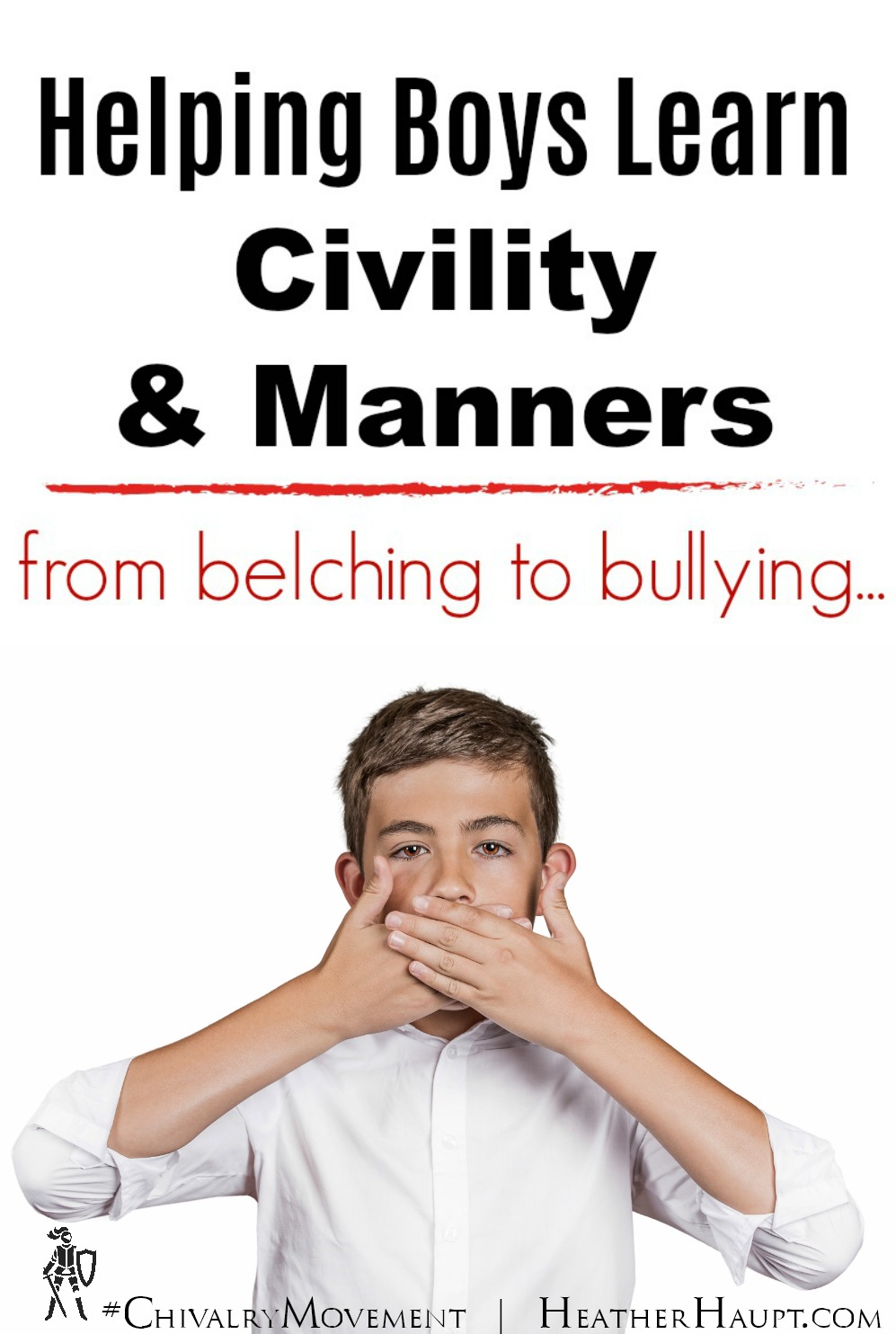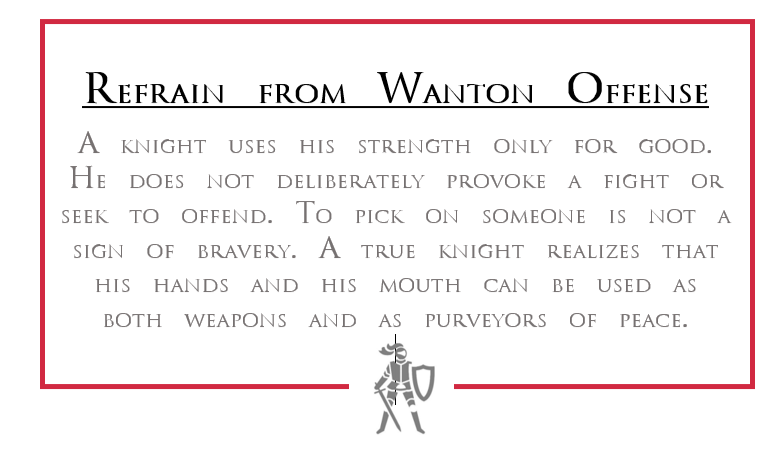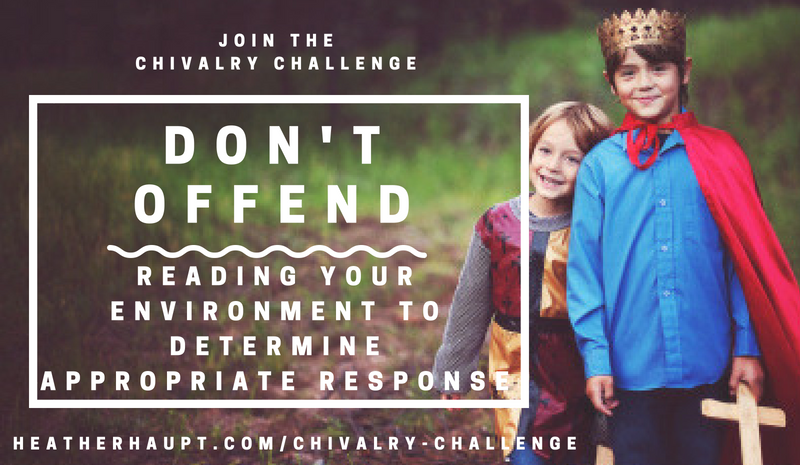
Civility, Manners, and the RESPECT Factor
We live in a day and age where civility appears to be in short supply, manners too for that matter. Both are essential. Everyone wants to be respected. But to garner respect, true respect, we must first learn to extend respect to others. Our sons crave respect. We do our kids (and EVERYONE ELSE) a big favor when we help them see the connection between extending respect and garnering respect. We also need to help them develop the awareness needed to read the situation and respond appropriately.
When it comes to instilling these values in our sons and helping them to internalize them, we look to inspire them with why it matters, equip them with the HOW’s, and then we need the perseverance to follow up with giving them ample time to PRACTICE these lessons in civility! That was the aim of chapter 11 in Knights in Training.

Wanton is an old Saxon word that literally means “badly trained.” It came to denote behavior indicating someone without breeding, someone left to his own devices on how to live, get along, and survive.
What does bullying and belching have to do with one another? They both constitute the wanton giving of offense. While the effects of the first might have a greater impact on others than the latter, they both boil down to a lack of care and consideration for others and a dearth of awareness and self-control. A true knight does not get distracted by the inconsequential and does not see a fight where there is none. He does not provoke. A knight in training learns to master his tongue and his fists instead of allowing them to master him.
Lack of basic manners is also a way of giving offense. Picking your nose, passing gas, belching, and other bodily responses have their time and place. While boys derive immense satisfaction from unleashing such “weapons,” a true knight develops the situational awareness skills needed to determine when and where to not engage in such activities. He understands that there is a difference between how he conducts himself while eating dinner on a camping trip with his buddies versus eating dinner at a beautifully laid table alongside important guests. He understands that it is OK to run around boisterously at the park, but that he must conduct himself with quiet reserve at the library.
Our boys need careful, patient training just as much today as a page did in the Middle Ages. This duty must not be neglected because habits in these areas have an incredible impact not only on the lives of others but also on one’s own life. It is the job of parents, primarily, but also other adults in a child’s life to ensure that he gets this training, because most of it happens in the context of living life.
Kids fight, sometimes just for fun and sometimes for real. They tease, and occasionally it goes too far. They giggle and laugh while dribbling food all over the table. They will talk over others, interrupt you while you are trying to have a conversation with another adult, and will say something totally inappropriate at just the wrong time. Helping your kids in this area requires lots of work because children are not born civilized. It is our job to civilize them. Perseverance is essential; the payoff incalculable.
-From Knights in Training, chapter 11
Situational Awareness is KEY!
When it comes to reaching our boys’ hearts and motivating them to be their very best, it is helpful to speak their language. Talking to our sons about situational awareness is powerful. Situational Awareness is simply awareness of what is going on around them and the ability to react appropriately. Acutely developed situational awareness skills were important for the knights of old – for heroic feats and their very survival. They are just as critical today. It is important when rescuing people and fighting against injustice. And it is foundational for learning the art of civility.
In our home we circle back to the idea of developing situational awareness skills ALL.THE.TIME. We remind them that developing these skills will help them both now and in the long run.
Strength in Self-Restraint
There is strength in self-restraint. And just about every boy wants to be strong. These days, self-restraint is in short supply in our insta-everything society where appetites tend to rule supreme. We are seeing a rapid rise of narcissism when appetites are not pulled into check. When it comes to manners and civility, if a person is not willing to delay their own wants to meet the needs of others or pursue peace, than craziness ensues.
When our kids don’t learn to read situations appropriately and develop the self-restraint needed to make proper choices, it can hurt them both now and down the road.
A young man comes to mind who set out to land his first big job at a law firm. He nailed the formal interview – showcasing his skills and his prowess in his craft. That evening a dinner was planned with several people from the firm. Feeling good about the interview, he let his guard down, told a few slightly off-color jokes, and enjoyed being chummy with those who he assumed would be his future fellow-coworkers and boss. What he failed to realize was that this dinner was part of the interview. And he failed this portion. It cost him the job.
Our boys need to learn self-regulation and develop situational awareness skills to know how to traverse a wide variety of situations. But they can’t do this without us. It’s our job to prepare them
CIVILITY and BULLYING
While it might seem strange at first glance to mention bullying and belching as related to one another, they are related because they both boil down to a lack of civility. Our kids need to know that we don’t want them starting fights, although occasionally there might a situation where they need to end one. They need help practicing alternative ways to solving conflict that DON’T involve fists.
Boys also frequently like to tease and sometimes that teasing goes too far. That’s where situational awareness skills come into play. There is a time and place for smack talk and a time to put a lid on it. We need to work with our boys on reading body language to determine if the other person likes teasing or if it is an appropriate person or time/place to engage in teasing. If both parties aren’t enjoying it, than mere teasing can slip over into the realm of harassement or outright bullying.
Our children are not born civilized. They need us as parents and then the community at large to come alongside and train them on how to be in community with others, how to treat others with respect.
And that brings me to this month’s CHIVALRY CHALLENGE!

Learning the art of civility is something that will take the duration of their childhood and ultimately requires our attention for the rest of our lives. (Facebook or Twitter, anyone???) While it can be easy to want to focus on ALL.THE.THINGS – ALL.AT.ONCE, as parents need to be wise and use self-restraint to only pick a few things to work on at a time.
So grab your copy of Knights in Training and re-read chapter 11.
It includes the following sections
- Learning to Listen and Watch for Clues
- Controlling the Tongue
- When a Boy Discovers His Hands
- Learning the Art of Disagreeing
- Manners Matter
- One Must Know the Rules to Play Well
- Nudge Don’t Nag
- Cultivating the Seeds of Courtesy
- Situational Awareness
- Throw Down the Gauntlet section
- You will find a massive list of practical ideas to start or continue working your kids on including learning to live at peace with others, general manners, greeting others, table manners, etiquette in a variety of situations, and discussion points for discussing situational awareness in these areas!
Here is your free download with some additional discussion points. I always love to ground everything in Scripture. The golden rule in Luke 6:31 comes to mind. Civility boils down to “doing unto others as you would have them do unto you.”
I’ve also included a poster print out of this aspect of the code of Chivalry and other resources.
So what do your kids need to work on? Learning how to greet others (especially in more formal situations), eating with your mouth closed (we are STILL working on this one), how to eat in a restaurant without a device to occupy oneself? Do you have one who doesn’t know how to stop teasing and sometimes takes on the role of bully? Make a list of just a few things you can work with your kids on and lay down the challenge.
Remind them of the why, discuss situational awareness, and then prepare them to walk through life situations that come up with strength and self-control.
New to the Chivalry Challenge?
You can read all about the Monthly Chivalry Challenge here?
Want a fun and focused approach to raising your sons, grab my book, Knights in Training. You can read more about it here.
Grab your #KnightsInTraining and #ChivalryMovement gear here!


Leave a Reply